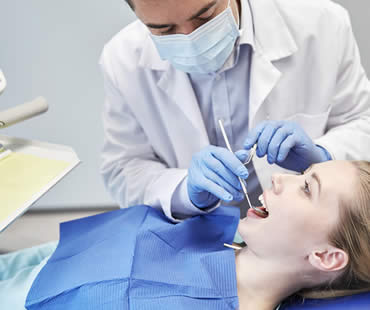
If you didn’t have your wisdom teeth out as a young person, you may be wondering about having them out as an adult. Your dentist may have recommended that you prevent future infections, cysts or pain in the jaw due to wisdom teeth that are growing under other teeth – known as impacted teeth. Even a type of tumor has been linked to impacted wisdom teeth.
Impacted teeth result when the wisdom tooth grows up under an existing tooth. Sometimes, adults have wisdom teeth that come in completely straight behind back molars. In rare cases, one or more of these teeth don’t grow at all. An x-ray can reveal the presence of the teeth. Impacted teeth cause problems with existing teeth and must come out.
Because the roots of wisdom teeth typically fully develop near the age of 24, removing them after this time can be more complicated. Roots can entwine with facial nerves, making extraction problematic. It’s recommended that adults receive a CT scan of their jaw, showing the clear positioning of facial nerves and roots, something not shown by x-rays. If the roots of the lower wisdom teeth aren’t touching or wrapped around the alveolar nerve, extraction is still possible.
Adults with wisdom teeth are at higher risk for gum disease. Gum disease has been linked to an increase of pregnancy complication and other health issues. Previously believed only to affect patients in their late 30s, this gum disease is now being shown to affect much younger patients, especially young pregnant women. Growing evidence is also connecting gum disease to inflammation due to chronic infections in the body, leading to an increased risk of diabetes and heart disease.
Talk to your dentist today to see if you should have your wisdom teeth removed. Be honest about any symptoms you’re having, such as pain or pressure, and let the professional evaluate your specific situation.
Are dental issues holding you back? Take control of your oral health by booking an appointment with our experienced team at our Toronto dental office.

Wisdom teeth are the third set of molars, and usually emerge in the late teens or early twenties. Standard dental practice is to remove wisdom teeth prior to them being fully formed when the roots have not yet had a chance to develop and fully root into the jaw. Younger patients usually have an easier recovery from surgery and many dentists believe early removal prevents future dental problems associated with wisdom teeth.
If your wisdom teeth were not removed as they emerged, there are some signs and symptoms that would indicate the need for extraction including:
- Wisdom teeth that are impacted, which means they have become trapped in the jawbone or gums.
- Wisdom teeth that are emerging at an awkward angle, causing pressure on adjacent teeth.
- Wisdom teeth that do not fit in your mouth, causing crowding of the surrounding teeth as well.
- Wisdom teeth that are suffering from decay or disease caused by the inability to keep them cleaned properly.
- Wisdom teeth that have developed fluid-filled cysts near the gumline.
- Wisdom teeth that are causing pain due to any of the above reasons.
The decision about whether or not to remove your wisdom teeth should be made in consultation with your dental professional. Your dentist or oral surgeon can assess the position and health of your wisdom teeth and make a recommendation for treatment.
If extraction is recommended, they may choose to extract one tooth or all four molars at once. Recovery from the outpatient procedure takes just a few days, and you will quickly be back to normal. Consult with your dental professional if you are experiencing any of these symptoms listed to determine if you should consider wisdom tooth removal to ensure your future good oral health.
Ready to transform your smile? Schedule your appointment today at our Toronto dental office.

Chewing and swallowing can be tricky after wisdom tooth extraction. Gauze pads and a sore mouth can make eating sound unappealing, but it is vital to your healing to maintain a healthy diet. When you have a tooth extracted, a clot forms to help with healing. It’s important not to disrupt the clot, which means it is crucial to maintain a soft-food diet. In addition, spicy, acidic or hard-to-chew foods can cause additional discomfort and prevent healing.
For the first one or two weeks after your wisdom tooth extraction, plan to stick to a diet of soft, easy-to-chew foods. This guideline does not mean you are stuck eating Jello for your entire recovery period. Some suggestions for healthy foods that would be appropriate after wisdom tooth extraction include:
- Mashed potatoes
- Milkshakes
- Cottage cheese
- Macaroni and cheese
Be careful never to use a straw during recovery, as the suction can remove the clots in your gums and create problems with healing. Some of these foods may still be too chewy, so you will need to gauge if they need to be cooked longer or further softened to make them easier to ingest. Pasta or macaroni can be overcooked to make it easier to chew, and soups can be blended to eliminate chunks of vegetables or meat. Be sure to follow the aftercare and eating recommendations of your oral surgeon, and don’t push yourself to return to normal foods until your mouth feels ready.
Do not let another day go by without taking care of your dental needs. Request an appointment now at our Toronto dental office!

Wisdom teeth got their name because they are the final teeth to develop, usually in the late teens to early twenties, at a time when a person becomes fully mature or “wise.” Wisdom teeth are the third and final set of molars in the very back of the mouth. Most people have four total (two upper and two lower), but others never develop them at all. Wisdom teeth can be a valuable chewing aid, but often they are poorly aligned or don’t develop properly.
How do I know if I have them?:
Unless you start to feel them breaking through, you may not know whether you have wisdom teeth or not. Ask your dentist to examine you to see if these teeth are healthy and properly positioned. An x-ray may be required, and your dentist may refer you to an oral surgeon to be evaluated further.
Do wisdom teeth hurt?:
You don’t always feel anything with your wisdom teeth, but sometimes they are very bothersome. You may experience pain when they erupt in awkward positions, especially if the teeth rub against your mouth. Other problems include stiffness in the area, infected swelling of the gums, tooth decay, gum disease, and tooth crowding.
Why remove them?:
Your dentist or oral surgeon might suggest that your wisdom teeth be extracted. They can often predict if your wisdom teeth may crowd or damage other teeth, your jawbone, or nerves. Sometimes removal is appropriate before problems arise, in an effort to avoid more complicated or painful extractions later. Removal is usually simpler and less risky in young people. If your wisdom teeth are not extracted, it’s important for your dentist to continue monitoring them because problems may develop later.
What does impacted mean?:
Wisdom teeth may be impacted, which means they are enclosed in the soft tissue or jawbone or they only partially erupt through the gum. Impacted wisdom teeth are almost always removed to avoid risks of infection, tooth decay, and gum disease.
Take the first step towards optimal oral hygiene. Reserve your dental appointment at our Toronto dental office now and experience personalized care.

There are a number of reasons people choose to get dental veneers, which are able to hide all kinds of tooth problems. These thin porcelain shells are bonded to the front surfaces of your teeth and can transform an embarrassing smile into one to fill you with pride. One of the most common reasons that many patients opt for veneers is to hide discolored teeth.
No matter what the cause for it, teeth can lose their bright white shine over time. It can be from consuming foods and drinks that tend to stain teeth, such as red wine, coffee, berries, sodas, and other culprits. Or it can be side effects from medications, including the antibiotic tetracycline which can cause severe tooth discoloration if taken during a child’s formative years. Poor oral hygiene can also contribute to yellowed teeth, as well as tobacco use. Aging in general tends to discolor teeth too.
If your teeth show the effects of staining or yellowing, and you’d like to get that healthy youthful glow back, porcelain veneers are a good option. They provide a unique advantage of never staining, so they look like new the entire time you have them. With proper care, your veneers should last for decades or even a lifetime. That means a bright, white smile that won’t deteriorate!
Another great benefit about veneers is that they provide an instant improvement to your smile. As soon as they are placed, your smile will be transformed. If you have concerns about what they will look like, many dentists are able to use computerized photo imaging technology to give you an accurate idea of what to expect. This may alleviate any hesitations about veneers being the right solution to hide your discolored teeth. Ask your dentist today about the possibility of getting veneers to improve your smile.
Do not wait any longer. Book your appointment now and achieve the smile you have always wanted. Dr. Cruz is accepting new patients from Toronto and the surrounding area.

Veneers are a terrific option to create a dazzling smile. These shells fit right over your real teeth to hide a variety of cosmetic problems. Veneers are typically made of porcelain, giving you a natural and long-lasting smile.
How are they applied?:
Once you and your dentist decide that veneers are right for you, a small amount of your tooth enamel will be removed so that they fit correctly. An impression of your teeth will be made and sent to a dental lab for the veneers to be custom made. When they are ready, you will return to your dentist to have the veneers attached to your teeth with a special adhesive.
What are the benefits?:
It is hard for others to tell you have veneers because they look very natural. They are shaped just for your smile, and you select the color. Veneers resist stains from things like coffee, red wine, and tobacco use. Veneers are also a great choice because they fit right over your own teeth, without requiring more extensive procedures.
Are there disadvantages?:
Some patients experience increased tooth sensitivity after getting veneers due to the minor enamel removal. Also, veneers are permanent and the process cannot be reversed. Another thing to keep in mind is carefully choosing your veneer color, so that your smile isn’t overly white or unnatural.
Are veneers right for everyone?:
Veneers are great for hiding chips, cracks, gaps, or uneven teeth. They are whiten teeth that haven’t responded well to other methods. Veneers may not work for patients with weak teeth from decay, large fillings, or fractures. Patients who grind their teeth or clench their jaws may also be poor candidates because consistent wear can crack or chip the veneers.
What about maintenance?:
Veneers last ten years or more with good care. Practicing proper dental hygiene is important to avoid decay of your teeth under the veneers. Avoid nail biting or chewing on hard items like ice or pencils, which may break the thin veneers. Normal brushing and flossing is acceptable, and regular dental checkups are important in maintaining good oral health.
Are dental issues holding you back? Take control of your oral health by booking an appointment with our experienced team at our Toronto dental office.







 E-Mail Us
E-Mail Us  416-595-5490
416-595-5490








